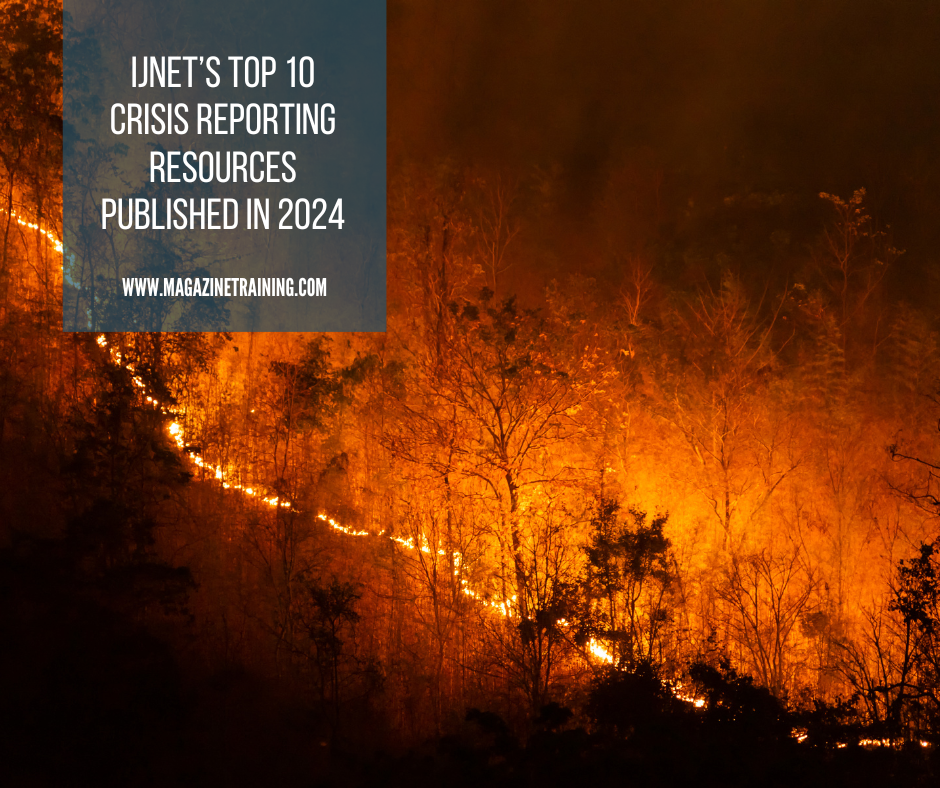
2024 was an intense year for journalists.
Reporters covered elections in more than 60 countries, capped by the U.S. results that will bring Donald Trump back to the presidency in January. Russia’s war on Ukraine has continued, and Israel’s war with Hamas expanded to Lebanon and deepened the humanitarian suffering in Gaza. Extreme weather events caused widespread destruction in Spain and the U.S., bringing home the growing costs of climate change. And in just the past month, the 50-year rule of the Assad family came crashing down as rebels swept into the country’s capital.
Journalists have responded quickly to report on these events even as they face increased repression from state actors, a collapse in public trust, and the rampant spread of disinformation online. Journalists’ jobs, to put mildly, have not been easy this year.
Through our Crisis Reporting Forum at IJNet, we hosted live training sessions and discussions to help journalists stay on top of these major global developments. In our “IJNet Conversations” series launched this year, we reached out to experts and writers in the IJNet network to offer their expertise and advice for journalists on the fundamentals of the trade.
Here are recaps of six crisis reporting sessions and recordings of four practical resources for journalists that remain relevant heading into 2025:
Crisis reporting resources
Journalists speak to the challenges of covering the Israel-Hamas war
The devastating Israel-Hamas war surpassed its one-year mark in October. Humanitarian conditions in Gaza have continued to deteriorate, especially in northern Gaza, where Israeli authorities have blocked some humanitarian aid while other aid that has made it into Gaza has been ransacked by armed groups, leading to warnings of famine. In the spring, pro-Palestine campus protests swept across U.S. colleges, and in the fall Israel invaded southern Lebanon. The Iran-backed militia group, Hezbollah, and Israel agreed to a ceasefire in late November.
In May, we spoke to three journalists from Israel and Palestine on the ways they’re keeping eyes on the conflict, the challenges they face, and their advice for reporting on it accurately and ethically.
Advice for journalists forced into exile
The start of Russia’s full-scale invasion of Ukraine in 2022 led to an exodus of independent newspapers and journalists from the country. Russian journalists who fled continue to report independently, joining a growing trend of “exiled media” globally finding ways to reach audiences in their home countries while reporting from abroad.
In June, we spoke with two journalists from the Network of Exiled Media Outlets (NEMO), with whom we partnered to create our Exiled Media Toolkit, about their advice for journalists newly in exile, including how to keep outlets financially viable, ways to reach audiences in their home countries, and more.
Key reporting advice from a year of elections worldwide
Over half of the world’s population voted in elections this year. In October, we brought together journalists from Germany, South Africa and Venezuela to share their reflections and advice from reporting on elections in their countries.
One major challenge journalists faced was striking a balance between accurately reporting on an antidemocratic party’s platform and inadvertently amplifying its message, said Laura Goudkamp, who reported on the far-right Alternative for Germany (AfD).
“Our role is to inform the public so they can make informed decisions, and we need to find better ways to communicate effectively when a candidate or action threatens democratic values,” echoed Venezuelan journalist Dariela Sosa.
Related posts
Magazine Training International’s mission is to encourage, strengthen, and provide training and resources to Christian magazine publishers as they seek to build the church and reach their societies for Christ.

